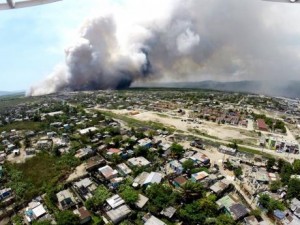
Chronicles of a Fire Foretold
August 21st, 2015
by Anaitée Mills
“….The day began like any other day. The family awoke early and the “likkle pickney dem” started getting ready for school. There was something different about that day though, birds were not singing, neither was the sun shining and the air was not filled with the usual Caribbean breeze. The day felt a bit too dark; “maybe it will rain”, said the mother to herlself while preparing breakfast. The air was filled with a smoky smell and it was heavy. “This is not rain”, said the father, “the dump is on fire!”

Photo courtesy of The Observer Jamaica
Alright, maybe I’m not Gabriel García Marquez and this is definitely not book material but the story I am about to tell you is worthy of making it into a terror thriller. Earlier this year, the Riverton City Dump in St. Andrew, Jamaica caught fire. More than 100 hectares of all sorts of hazardous and non-hazardous waste burnt, resulting in a massive inferno and harmful smoke which badly affected for more than ten straight days thousands of people living in the close community of St. Catherine. Even Jamaica’s lively capital Kingston was covered by a thick smoky cloud.
Now that the smoke has finally blown away, it is time to analyze what went wrong. The National Solid Waste Management Authority (NSWMA) has the responsibility for the operation of the Riverton City Dump, which exceeded its capacity long ago and receives 60% of the waste produced in Jamaica. Figures show that here in Jamaica approximately 1,120,164.54 tonnes of waste are generated annually. This suggests a per capita generation in excess of 1 kg per person per day!
Despite efforts at improvement, the current capacity (institutional, personnel, financial, technological, and logistical) of the NSWMA is inadequate to efficiently and effectively manage the increasing generation of solid waste. Additionally, the Authority is burdened by the dual and conflicting role it has to play as collector and regulator (Planning Institute of Jamaica 2007). Many institutions, including the Inter-American Development Bank, NGO’s, environmental groups and the private sector have attempted to find solutions and remain today highly interested in getting their “hands on” helping solve the problem.
Photo author Gladstone Taylor, The Gleaner
Jamaica is absolutely not the only country which has experienced similar waste management crises. The issues arising from Urban Solid Waste Management (USWM) in developing countries have been an important concern for scholars and policy-makers all over the globe. Effective management of municipal waste is required, but local authorities in many countries are constrained by limited finances and inadequate services. The decisions in the area of municipal solid waste management are not only very capital intensive, but also difficult from the environmental and social points of view.
As urbanization continues to advance, the management of solid waste is becoming a major public health and environmental concern in urban areas of many developing countries. Large municipalities and metropolitan regions are encouraged to undertake city-wide strategic planning to design and implement integrated solid waste systems that are responsive to dynamic demographic and commercial growth. Strategic planning needs to start with the formulation of long-term goals based on the local urban needs, followed by a medium- and short-term action plan to meet the goals.
The waste management crisis in Jamaica is serious but it can be solved. There is an urgent need to develop and enforce a comprehensive National Solid Waste Management Programme, taking in consideration potential for productive alternatives (waste-to-energy) and including public education on waste management, tapping on consuption patterns and sorting strategies for the general public. It is time to take the resources and the technical expertise and put them into action.
The Riverton City Dump is a chronicle of a fire waiting to happen….(again).
Tags: city dump, Jamaica, Riverton City Dump, solid waste, urban solid waste, waste management
The Gleaner reserves the right not to publish comments that may be deemed libelous, derogatory or indecent.
To respond to The Gleaner please use the feedback form.
- Three ways the Caribbean can strengthen financing for private companies
- Learning about Jamaica’s Forests by Hiking the Blue Mountains
- Making People Happy
- US Supreme Court: One Less Known Example of How a Supreme Court Decision, Shapes Up Judiciary Reality in the Caribbean
- Crime in Paradise: Preview of Forthcoming IDB Study on Crime in the Caribbean
- Caribbean Diaspora: How Can They Finance Development in the Region?
- Zika Virus and the Economic and Human Reproductive Health Implications for the Caribbean
- Proper Solid Waste Management Involves all of us
- Victimization surveys: 3 common mistakes to avoid
- Social Innovation: The way forward for Civil Society Organizations


